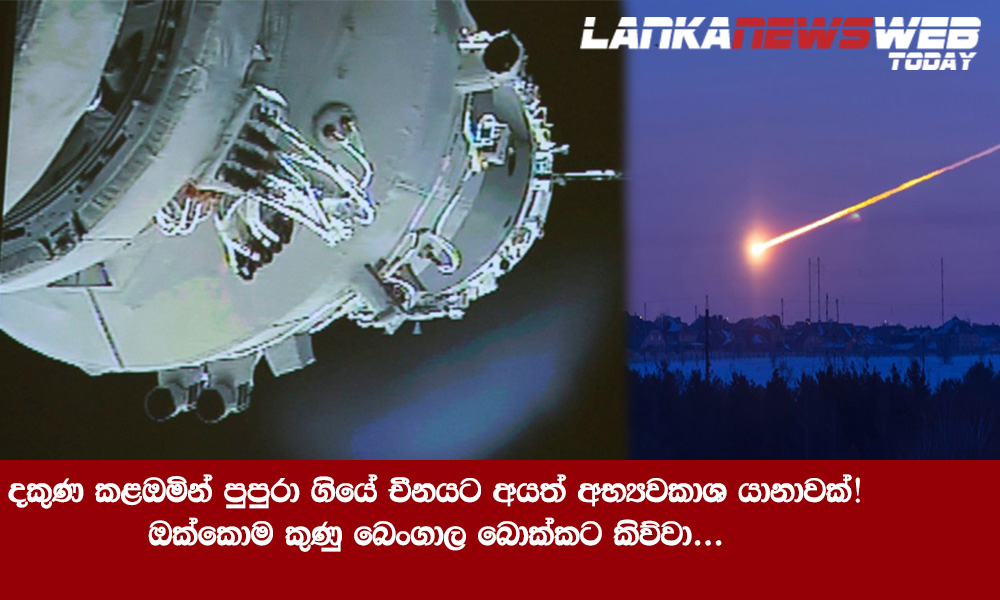දකුණේ ජනතාවගේ භීතියට පත්කරමින් පසුගියදා රාත්රීයේ (18) රාත්රී 9 ට පමණ විශාල පිපිරීම් හඬක් අසන්නට ලැබුනු අතර ඒ සම්බන්ධයෙන් විවිධ කතා පැතිර ගියද මේ වනවිට එම පිපිරීම් හඬට ආසන්නතම හේතුව අනාවරණය වි තිබේ.
ශ්රී ලංකාවේ දකුණු ප්රදේශයේ මුහුදට විශාල ශබ්දයක් නඟමින් කඩා වැටී ඇත්තේ චීනයේ ටියෑන්ගොන් (tiangong-1)අභ්යවකාශ යානාවක් බවට සැක පහළ වී තිබේ.
“Heavenly Palace” යනුවෙන් හදුන්වන එම යානාව මිටර් 12කින් යුක්ත වන අතර මිටර් 3.3ක විෂ්කම්භයකින් යුක්ත වේ.
මෙම අභ්යවකාශ යානාව තම පාලනයෙන් මිදී ඇති බවත් එය 2017 ඔක්තෝබර් සහ 2018 අප්රේල් පෘථිවියට කඩා වැටෙන බවත් චීන අභ්යවකාශ බලධාරීන් එක්සත්ජාතීන්ගේ සංවිධානයට දැනුම්දී තිබුණි.
ටොන් 8 ක් බරැති මෙම අභ්යවකාශ යානාව පෘථිවියට එනවිට එහි කිලෝ 100 ක්වූ කැබලි බවට පත්වන බවද චින මාධ්ය වාර්තාකර තිබේ.
කෙසේවෙතත් ශ්රී ලංකාවේ දකුණු මුහුදට කඩා වැටුණේ චීන අභ්යවකාශ යානාව බවට චීනය මෙතෙක් තහවුරු කර නෑ.
Disabled Chinese space lab likely to crash to Earth in coming months
A defunct, yacht-sized Chinese space lab is expected to fall out of orbit and crash to Earth in the coming months.
China launched the eight-tonne Tiangong-1 satellite in 2011. Tiangong means “Heavenly Palace” in Chinese. The satellite, which is 12 metres long and 3.3 metres in diameter, was designed to test technology for a future space station. The Chinese space program used it for a series of spacecraft docking tests and visits from astronauts.
The space lab broke down and stopped functioning in March 2016. That means China’s space agency no longer has control of it.
Chinese officials told the UN secretary general in May 2017 that Tiangong-1 was expected to re-enter Earth’s atmosphere between October 2017 and April 2018.
But as of Oct. 19, the satellite was still orbiting at an altitude of 305 kilometres above the surface and wasn’t expected to come down immediately, according to the satellite tracking site SatFlare.
Low risk
When it does crash, China says the risk that it will cause any damage or injury to aircraft or people or things on the ground is “very low” since most of it will burn up in the atmosphere as it falls.
However, Jonathan McDowell, an astronomer at the Harvard-Smithsonian Centre for Astrophysics, told the Guardian last week that pieces of up to 100 kilograms could crash down on the Earth’s surface. At that time, he said the satellite has begun dropping more quickly as it reaches denser parts of the Earth’s atmosphere.
McDowell tweeted that the satellite is similar in size to other objects that fell to Earth from orbit in 2012 and 2015 and just a fraction of the size of NASA’s 77-tonne Skylab space station, which went down in 1979.
China said it would monitor Tiangong-1’s descent and post its orbital status on the China Manned Space Agency website, but nothing has been posted on the website under “Tiangong-1 orbital status” since July.
Once China has the final forecast for the time and region of re-entry, it says it will issue an “early warning in a timely manner” and bring that to the attention of the United Nations Office for Outer Space Affairs and the secretary general of the United Nations.

